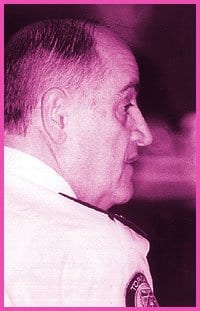When Julian Fantino was appointed Toronto’s top cop back in 1999, it didn’t seem like he really wanted the job. He didn’t formally apply and publicly stated that he wasn’t interested though he did show up for the interview once a headhunting firm contacted him.
Yet, faced with upcoming contract expiration, Fantino, 62, went to the Police Services Board to ask for an extension, but was denied. Perhaps it was the public endorsement of Mayor David Miller’s rival, John Tory, during the municipal election campaign that led to his downfall.
“I was very happy,” says long-time gay activist Tim McCaskell of the board not renewing Fantino’s contract. “When I think of the last four years I can’t think of much to say that’s good about him.”
Not all queer Torontonians have the same reaction. The day before the board’s decision was released, Rev Brent Hawkes endorsed Fantino at the chief’s annual Pride Week reception.
“I said that I hoped that we would see him at these events for many years to come so I guess that’s sort of an endorsement,” explains Hawkes. “My personal feeling is that I would have supported his renewal. I could work with him and he was accessible. He would listen to my concerns both in meetings that I was attending and one-on-one.
“I was first of all shocked, honestly. I had no indication, and I don’t know that he did, that a decision had been made or was about to be announced,” says Hawkes. “I had called [the Police Services Board] saying I hoped he would be renewed.”
Hawkes has worked with Fantino as a member of the chief’s Community Advisory Council.
“My worry was that if he was not extended it would take a new chief a while, it would be a learning curve,” says Hawkes.
Howard Shulman, co-chair of the LGBT [lesbian, gay, bisexual, trans] Community Police Consultative Committee, says his reaction to the news was mixed.
“He did seem to be interested in reaching out to the LGBT community,” says Shulman. “He did make some attempts once he got his appointment to gain back the trust of the queer community and other marginalized communities – especially after what had happened in London.”
As London police chief, Fantino led a twoyear, $1.5-million investigation into a supposed London-based child pornography ring. Despite arrests of more than 60 men (all but two of whom were reported to be gay) very few convictions were made. Most charges were against men who had engaged in consensual anal sex with youth, aged 14 to 18, or who paid teenage hustlers for sex.
London wasn’t the first controversy for Fantino. In 1989, he presented race-based crime statistics to the North York race relations committee. His comments about the overrepresentation of young black men versus their population in the Jane and Finch area angered community residents and set the tone for his work with minority communities more than 10 years later when he became chief.
Hawkes and Shulman say Fantino was effective in improv-ing relations with lesbian and gay people, pointing to the creation of the police consultative committee and a community liaison officer – a position now held by Jackie O’Keefe – as examples of his success.
“In terms of the Bruner report, which I had a hand in, some of the key recommendations had sat for 20 years and he implemented them,” says Hawkes. (In 1981 Arnold Bruner was appointed by council to review police relations with Toronto gay people following the bathhouse raids, in part as a result of a 25-day hunger strike by Hawkes.)
McCaskell disagrees. “I don’t think he can really take credit for that. The community had been demanding and lobbying for years and years. At some point whoever is there has to come to terms with the demands. I don’t think he went out of the way to make sure they happened. It’s not like Fantino came in because his first priority was better relations with the gay community.”
As well under Fantino’s tenure, male plainclothes officers raided a women-only bathhouse event, resulting in liquor licence charges that were eventually quashed when a judge found the investigation to have violated the rights of the organizers. Fantino’s con-tinued refusal to apologize for the incident has in part resulted in a case now before the Human Rights Tribunal Of Ontario.
There were other problems in 52 Division, which used to police the Church-Wellesley Village, under Fantino’s five-year reign. During Pride 2002, officers arrested nudists in the parade, only to see the charges tossed. This week 55 charges were laid against nine 52 Division officers in the wake of corruption allegations where they may have swapped favours with bars and sex workers.
Who will fill Fantino’s shoes?
“I hope the police [board] doesn’t do a knee-jerk reaction and fill the position,” says Hawkes. “I hope they take some time to do some consultation.”
Hawkes would like to see a chief who is innovative and willing to explore the kinds of initiatives that appear to be working in other jurisdictions around North America, particularly in the area of community policing.
McCaskell says he would like to see a chief with a new orientation toward communities. “Someone who is less interested in machines and guns and more interested in the social determinants of crime.”

 Why you can trust Xtra
Why you can trust Xtra


